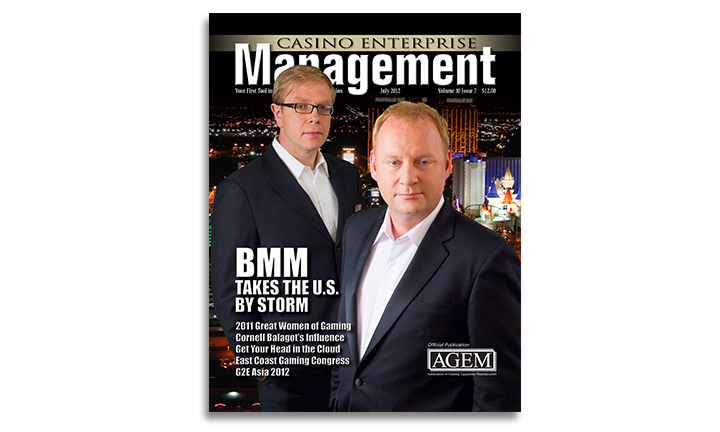There has been no shortage of news stemming from BMM lately, from new licenses to certifications, anniversaries to appointments, and even a new world headquarters in Las Vegas. There’s no doubt about it—BMM is seriously busy, and with their interesting history, experienced leadership, company outlook and exciting initiatives, they are finally set to take on the U.S.
At the helm of it all is BMM President and CEO Martin Storm. A man with flair (in a good way) who can often be seen in his signature Led Zeppelin T-shirts, he’s surprisingly relaxed and has a cool demeanor, but strike up a conversation and you’ll realize how insightful and driven he is. He strives to evolve BMM as the best gaming test lab in the world, and though he’s encountered challenges throughout the years, he’s extremely focused on reaching his goal.
This expert test lab has countless items on the list of what sets them apart. Even at various trade shows, BMM’s booths always stand out, most recently evident at the Indian Gaming show with its contemporary clean design lines and exquisite tribal artwork. But of course, the substance behind the company is much deeper than their attractive trade show displays.
BMM’s Beginning
Many people may be surprised to learn that independent gaming labs did not begin in the U.S., and BMM’s own history starts in 1981, making it the longest-established independent gaming certification lab in the world. It was in November that year when Hugh Monypenny, Cliff Bellamy and Patrick Miller established BMM in Melbourne, Australia. BMM, which stands for Bellamy, Miller and Monypenny, first offered IT services focusing on technical assurance and early on won contracts with very large gaming enterprises Tatts and Tabcorp. BMM really cut its technical teeth, so to speak, on large-scale wide-area network lottery and pari-mutuel gaming systems.
Then in 1992, the Victorian government decided to regulate gambling. BMM was chosen to author the first set of technical standards for gambling, which became the foundation of much of what is followed around the world today. BMM also gave technical support to the government and then certified all of the systems and slots. Through this relationship with the government, BMM gained deeper experience with online monitoring systems, casino management systems and slot machines. It was the foundation of what was to follow in the second wave of the company.
Bellamy had passed away, and Monypenny and Miller were approaching retirement age. Enter Martin Storm, who in 2002 took on the role of CEO to build the business globally. In 2005, he exercised a contractual right to acquire the majority of the business, changed its structure to make BMM a U.S.-based company and moved the global headquarters to Las Vegas. He later acquired the remaining minority equity.
“The 2005 transactions that led to the change of ownership positioned BMM to compete in the U.S. and Europe, transforming its potential into a truly international business,” Storm commented.
It was clear to Storm that the industry was globalizing for major gaming manufacturers, who were building product in one market and selling it in many. In order to bridge the gap, he expanded BMM overseas. From the start, Storm’s key strategy was to grow BMM Australia’s domestic market share as his financial platform for international expansion. Over two years, BMM grew its share by about 40 percent and established its plans.
So with a strong presence in Australia and a growing team in Las Vegas, BMM opened its South African operations in 2005, quickly moving to a market leadership position there. BMM Spain, Austria and Peru opened in 2007, quickly followed by Macau in 2008, Singapore in 2009, Mexico City in 2010, Canada in 2011 and Italy in 2012.
“Building a medium-sized global enterprise so quickly while choosing not to utilize investment capital comes with its challenges,” Storm noted. “A good friend described us once as ‘sprinting atop a picket fence.’”
But no challenge is too big for BMM to tackle head on. Today, it has more than 200 employees, 12 offices in 11 countries and customers all over the world. “It’s been a fully engaging journey for the business as a whole, but particularly for myself and my leadership group over the last few years,” Storm reflected.
But like any humble leader, he credits the work of his team for much of the company’s successes. “When I purchased BMM in 2005, I sensed a growth opportunity,” Storm explained. “Today, it’s clearly a growth strategy and fast becoming an enduring growth story, thanks to the efforts of so many. Thoughtfully hiring expert staff commands much of the attention of our operational management around the world, and particularly here in Nevada. Hiring activity seems to happen every day now.”
BMM’s People
Employing the best people in industry certainly helps Storm lead BMM into its market-leading position. In fact, some of the most recent hires have really impressive resumes and industry experience that Storm is grateful to have on his team. “We’re looking for exceptionalism, individualism and real strength in our people,” Storm said.
“They have to be strong enough to know what not to do as much as what to do. I appreciate executive push back.”
A key recent hire brings a host of experience in the Nevada gaming industry in particular and will be a major driver of BMM’s business there. Mike Dreitzer, BMM’s COO of the Americas, was a deputy attorney general of Nevada whose primary client was the Nevada Gaming Control Board, in addition to working as general counsel for Progressive Gaming and helping build Global Gaming Group. “Mike understands the government side, the regulatory side, the manufacturer’s side and the games content side,” Storm said. “Bringing Mike’s experience to BMM and its stakeholders is making a difference to our business and the certification industry.”
“For me it’s an interesting place to be; it’s the intersection of law, regulation and business operations,” Dreitzer said of his new leadership position. “I enjoy that, and I think it’s a very exciting time for BMM. Our objective is to improve the quality of the U.S. gaming product certification market.”
After bringing Dreitzer on board and monitoring the changes going on in Nevada, Storm and Dreitzer went to another big name in the ‘biz, Travis Foley, who is now BMM’s VP of operations for the Americas. Foley was technology chief for the Nevada Gaming Control Board lab, where he led the group through a period of unprecedented growth. He is now responsible for all testing and service delivery in the Americas for BMM, and Dreitzer says he’s “exactly the right guy to lead it.”
Through Foley and Dreitzer, BMM has attracted some of the best test engineering staff in the industry today to add to BMM’s already capable staff. When the Nevada lab began its transition away from certification testing, Adam Fong, who was instrumental in the development of the Nevada online regulations and another five top engineers, some of who had already moved to private industry, followed Foley. Also supporting the leadership team is Dennis Neilander, the former chairman of the Nevada Gaming Control Board. “There’s no question that BMM has the most experienced team in the country to prepare Nevada certifications for the state’s approval,” Dreitzer said. “That’s a significant change in the U.S. certification industry.”
In addition to Dreitzer and Foley, Storm is proud to have Richard Williamson, SVP of regulatory for the Americas. Williamson directed the famous state gaming lab in New Jersey for more than 20 years, where he hired future the founders of other well-known gaming test labs. He then established the Pennsylvania gaming lab before joining BMM in 2007. “In Rich Williamson, I believe we’ve got one of the industry’s most experienced lab and regulatory professionals for us on the East Coast,” Storm commented, “and now I believe we’ve got a top leader on the West Coast in Travis Foley. So when you combine BMM’s 30 years of experience with such amazing U.S. experience coming from the government sector, I’m not sure how anyone could do the job better than BMM in the U.S.”
This unique expertise also expands to other markets outside of the U.S. With Kirk White and Moosad Sreedharan in Australia and Asia, Tebogo Makamo in South Africa, and Albert Daude in Spain as other examples, Storm is confident in BMM’s regulatory leadership globally. In fact, it’s what he says is the key to BMM’s success in those key markets. “I believe that companies are people, and that great people build great companies. So my goal is to attract and retain great people.”
But the praise goes both ways. “BMM is a unique blend of 30 years of certification knowledge and experience, combined with a real commitment to performance excellence for all industry stakeholders,” Dreitzer said. “What makes that possible is a deep respect for staff as people and contributors to our values and goals. At BMM, we care, inside and out. And that begins at the top of BMM.”
Williamson added: “BMM’s care is strongly reflected in the quality of BMM’s certifications. In 30 years of certification work in the gaming industry, BMM has never had to use its Professional Indemnity Insurance or any other insurance to cover for errors or omissions in its testing, which test labs are often required by regulators to maintain.”
BMM’s Business
With such a culture of loyalty, integrity, teamwork and experience, BMM sure knows how to do business. Describing the daily work environment, Storm says it’s very free in style but quite structured when it comes to work. Though staff may dress in casual garb, Storm commented, “We don’t worry about matching polo shirts; we care about the quality of our work, the integrity of our relationships, and the standard of our services. We know that customers that come to BMM really appreciate that difference.”
To enhance its certification work environment, BMM recently announced a move from its existing global headquarters in Las Vegas into significantly larger premises on Pilot Road. By almost quadrupling its available space, BMM will accommodate more staff with enhanced testing laboratories, new technology integration infrastructure, expanded educational facilities and an improved workplace for all. “In a way, this new global HQ marks the beginning of BMM’s drive for equal status in the U.S. gaming market,” Dreitzer said.
Having such a large international business could be a challenge too, but BMM welcomes it. “From a global perspective, while here in Las Vegas, we’re focused on the Americas,” Foley added. “It’s very important that we work closely with our other regions and their operations. That includes not only service delivery, but also technical compliance support. While we know the compliance requirements in the Americas in great detail, our colleagues know the compliance requirements in their regions better. At BMM, we work closely together to operate as one global lab to deliver consistency, accuracy and access to the world. That’s the integrity of service we demand from ourselves and what our customers want.”
Dreitzer noted, “This is especially important to gaming manufacturers, as product certification transfers are quite common across markets today.”
Another unique aspect of BMM’s commitment to integrity is its Global Compliance Committee. Led by Chairman Steve DuCharme, former chairman of the Nevada Gaming Control Board and independent executive consultant Bob Cowley from Sydney Australia, the Global Compliance Committee meets quarterly to review compliance and governance for BMM entities with a particular focus on U.S. operations. As a participant on that committee, Dreitzer shared, “Integrity and transparency are fundamental to our relationships with regulators. The Global Compliance Committee, along with a strong regulatory outreach program led by our VP of Compliance Alisha Ray, help ensure regular communication with these critical stakeholders in the certification process.”
Williamson also explains that BMM has a long-standing commitment to gaming in tribal casinos with tribal jurisdictions. “We work closely with tribal regulators around the U.S.,” he said. “We are committed to supporting tribal sovereignty and protecting tribal assets through our technical and regulatory support. We work hard to be a trusted advisor to Indian gaming and provide not just education, but training that empowers regulators and staff.”
BMM’s tribal services include gaming product certifications, technical product and floor audits, forensics analysis, and compliance consultancy across technical standards, internal controls and risk management.
Storm is particularly interested in working with the tribal community on one key issue at the moment—i-gaming. He says while BMM has won some amazing certification projects recently, he’s most excited about BMM’s tribal education program on i-gaming. Referring to a panel discussion on i-gaming led by Williamson at the recent National Indian Gaming Association conference in April, Storm says it was the best session he had participated in his 10 years in gaming. “I know that BMM is bringing information, knowledge and experience to the tribes that they are seeking. Our information is helping them to make critical decisions about i-gaming. I can see it in the eyes of the audience—they’re thinking, ‘how come no one told me this before?’”
Williamson also shared that BMM has been particularly active in the i-gaming education space over the last 18 months and has a busy ongoing schedule of events planned.
But BMM isn’t new to the i-gaming sphere. In the late ‘90s, they started testing online systems and won many big customers around the world, before the i-gaming issue reached the U.S. shores. Storm says that BMM wrote the first comprehensive i-gaming technical standards back in 2001 and then significant articles about how to test i-gaming systems. Today, as the U.S. moves steadily toward legalization, BMM is more involved than ever in i-gaming certification, with a fully qualified i-gaming test group that is getting busier every day.
That certainly isn’t the extent of BMM’s impressive business resume. BMM did the technical consulting for gaming’s largest central monitoring system in the world that contained some 100,000 slot machines in more than 3,000 locations, and BMM also won the work for defining the NIGC’s technical standards. More recent projects involve several lotteries, including winning the certification for the Atlantic Lottery Corp. in Canada and the Illinois lottery business.
BMM’s Challenges
Any level of success hardly comes easy, and BMM has had its fair share of obstacles. But one gentleman key to BMM’s success in the U.S. has been Drew Pawlak, SVP for business development in the Americas. Joining BMM in 2004 from the amusement industry, Pawlak has been a constant in BMM’s journey in the U.S., where the company has encountered challenges. “The major business obstacle we’ve had has been U.S. market access,” Pawlak shared. “In the U.S., most of the certification business goes through one lab, which gives them much control over the flow of gaming product. And BMM should be able to fully compete in the U.S. market.”
Dreitzer added that: “Outside of the United States, BMM is licensed everywhere it has sought to get recognition. Globally, it’s accepted and acknowledged that if you’re qualified and licensable, you can be accredited to become a test lab in a given jurisdiction. Unfortunately, that’s not proven to be the case in all of the United States, although that is the overwhelming trend in the industry. More and more domestic jurisdictions are seeing the important public policy behind multiple qualified labs. In the same way that qualified professional services firms (such as law firms and accounting firms) have always been the standard everywhere, so to should it be the case for companies providing professional certification services.
Never the one to be beaten down, Storm explains that he overcomes the challenges by sheer persistence. “In one state, we are in our seventh year of conversations about recognizing our casino gaming certification reports. … BMM is committed to fair competition and market-based choice.” He relates the company’s challenges to climbing a mountain—the last hundred feet are the toughest, but they’re on a steep ascent.
In September of this year, BMM will have invested over 10 years in gaining U.S market access. There are nearly 300 jurisdictions in the U.S., and BMM is now only pursuing a remaining handful of them. “We are working toward licensure in Nevada in June, and we’re already licensed in New Jersey, Missouri, Mississippi and almost every other major jurisdiction in the U.S., including hundreds of tribal jurisdictions. With the exception of just a few, we are ready to serve the industry completely,” Pawlak said.
BMM’s Future
They’re certainly on track to continue major successes. BMM’s EBITDA grew 76 percent in 2011, coming off its second best year ever. Storm commented: “BMM is financially strong. We have navigated an extraordinary economic recession well. We’re in great shape and the future looks very exciting.”
Storm’s own goals for the future of BMM? He wants BMM to maintain its position as the best test lab in the world, but with complete U.S. market access, and he’s set three years to achieve that. “We’re going to use Nevada as the centerpiece for our gaming business internationally,” Storm explained. “With full U.S. market access, we are going to hire at least 150 people in Nevada, and that employment program has already started. I’m also hoping we can add another U.S. lab and employ more people there locally. In our world, our people are our business and our business is expanding rapidly.”
“The overall challenge is to live small but play big,” he continued. “BMM punches well above its weight. We want to win the heavyweight championship of the world as a middleweight.”
Storm also looks forward to a new kind of U.S. market emerging. “There are tremendous content supply and cross-platform opportunities for major players. The integration of cloud, server-based content and social media will drive new opportunities for players and the industry at large,” Storm said. “It is a really exciting market to be in and a great opportunity for us to provide more services, more value and help all the manufacturers, suppliers, operators and regulators get the job done better than ever before.”
Looking ahead even more, Storm hints that BMM has some really interesting initiatives coming that will make them a stronger and better company in the future. “Like every company, we’re constantly working on improving our business, and in this 10th year of operation since I’ve been here, we’ve got some really strategic internal projects to transform our business to another level,” he said. “I know that’s going to make us more valuable to our stakeholders.”
Work hard, play hard: Business aside, the people at BMM know how to have fun, even dropping hints of some karaoke-centric company events. “Culturally, we take our work very seriously but not ourselves,” Foley concluded.
Which is evident when Storm walks in to the boardroom wearing another of his classic Led Zeppelin T-shirts!
https://www.casinoenterprisemanagement.com/articles/july-2012/bmm-taking-us-storm






